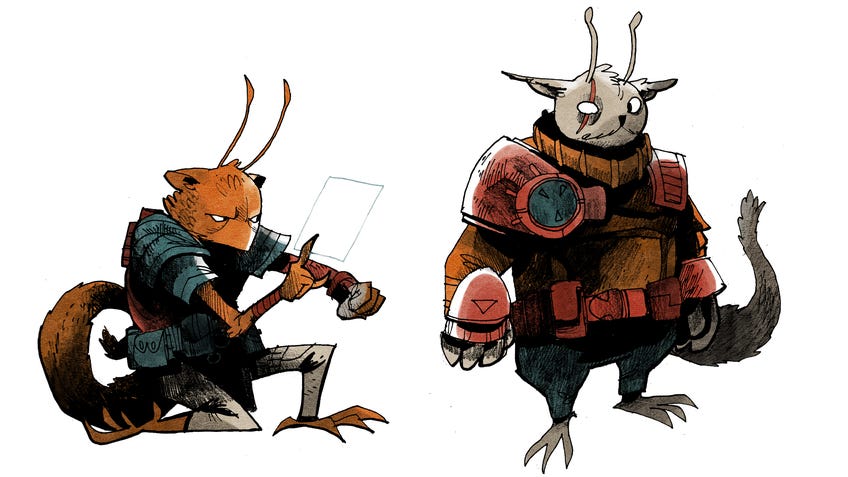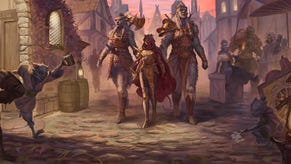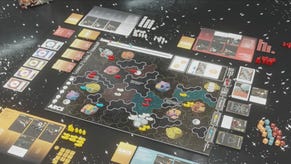“The most important thing is the conversation”: Root designer Cole Wehrle talks his next board game, Arcs
“I wanted a game that was faster and more dramatic.”
Cole Wehrle clearly cannot contain his excitement for his next big release. A science-fiction game inspired by everything from the video game FTL: Faster Than Light to the Broken Earth trilogy by N K Jemisin, Arcs: Collapse and Conflict in the Void is the black hole that’s been consuming Wehrle’s thoughts for the past few years.
“I'm so excited to talk to you about Arcs because we’ve been working on this game for a long time,” the designer says. “Much longer than I worked on Oath.”
Last year’s Oath: Chronicles of Empire and Exile was the second release Wehrle created for longtime collaborator Leder Games, the publisher that also released his breakout board game Root. Oath was an enormously ambitious board game whose narratives could span fictional generations. But the way that Wehrle talks about Arcs now makes Oath seem like a moon orbiting his next planet-sized board game; one that owes plenty to its forebears but has the potential to eclipse them all.
“Every product I work on is a reaction to the previous one,” Wehrle says. “By the time you finish a big game, even if you’re happy with it, you’re still dissatisfied.”

Arcs sounds huge in scope - with players able to experience the game “thousands of times” - but Wehrle wants it to be a much more accessible experience than the likes of Oath and Root. Wehrle has gained a reputation for making intricate board games that require a lot of investment before players can understand how they work, which simultaneously makes them attractive to the kinds of people who enjoy a challenge but scary to players who are still new to the hobby.
Arcs has some of the wildest different plot things that can happen.
“Arcs is big and grand, but in a way that’s much more approachable,” Wehrle insists. The size of the game is meant to allow for multiple, vastly different playthroughs, rather than presenting players with a tome of rules to get their heads around.
The designer explains that Arcs is “dramatically simpler than Root or Oath”, with players only needing to understand a handful of rules before diving in. The main gameplay systems of Arcs revolve around players travelling across different parts of a galaxy – which works the same as movement in Root – and getting into fights with one another, which sees players choosing between raiding, attacking or bombarding their opponents’ ships. While the appeal of playing Root and Oath over and over again came from the desire to master various strategies, Arcs “is a game about endings”. Unlike Oath, where the outcome of the previous game directly affected the beginning of the next, Arcs is a contained “modular” experience that will enable players to tell many different stories.
Arcs begins with players choosing between primary objectives designed to take them on a winding road towards an eventual end point. The length of that winding road is decided by the players, with a selection of objectives spanning one, two or three chapters. Whilst Wehrle recommends players start with a single-chapter objective, the inclusion of what the designer calls ‘intermissions’ allow them some breathing room to get to grips with the systems and gameplay mechanics of Arcs. “I got to write one of the best rules I've ever written,” he says, “which was - after a game is done - ‘Take a break.’”
The intention behind Arcs, besides its vast narrative scope, was to make a board game that moved quicker.
Every chapter of Arcs is intended to be played in a single session that could be as quick as under 60 minutes to a couple of hours. The intermissions serve as a moment for players to collect themselves, to think about the previous game and what they could do better in the next, as well as perform more specific tasks - such as spending victory points to establish a better starting point for the upcoming chapter. Whilst the game world in Oath was largely reset at the beginning of each new game, the world of Arcs is designed to dramatically change between chapters.
“Arcs has some of the wildest different plot things that can happen because we have this special exceptional space that allows us to tell stories that we've never been able to tell with our games before,” explains Wehrle.
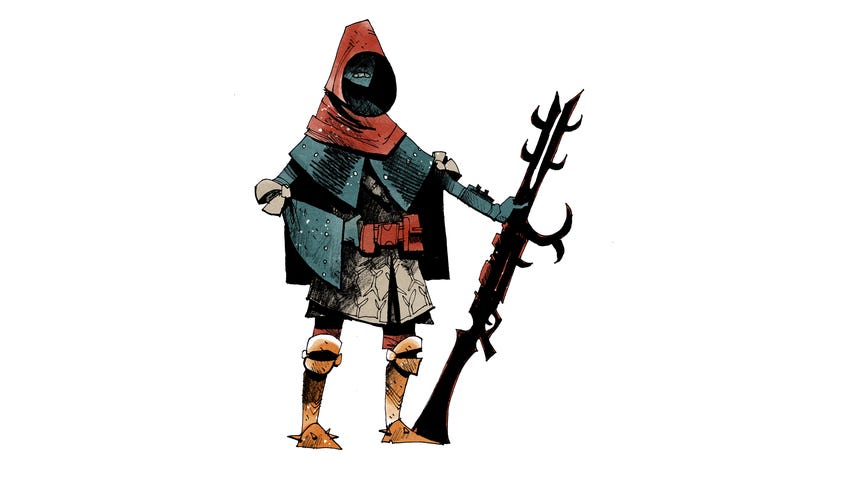
In Arcs, players will be able to impact the world in permanent ways – at least during that particular playthrough – whether that’s uprooting a governing empire or pushing the galaxy closer to complete annihilation, which will be reflected in gameplay as well as narrative. According to Wehrle, the intermissions are the ideal time for players to learn any new rules or gameplay mechanics introduced by player actions in the previous session, which were included as a direct response to issues the designer spotted in Oath. “[When designing Oath] I would have a really cool card idea and say, like, ‘Oh, I can't actually put this card in, because it is so disruptive to the game.’”
Arcs was always destined to be hugely ambitious and expandable.
The intention behind Arcs, besides its vast narrative scope, was to make a board game that moved quicker than Wehrle’s previous titles, providing a more “dramatic” experience where big things could happen in roughly the same amount of time it took to finish a game of Root or Oath. Wehrle mentions science-fiction board game Twilight Imperium, citing a desire to make something that evoked its epic space opera themes but didn’t take hours and hours to play. This, alongside influences from ‘90s computer games and a book series on the making of Star Wars, drove Arcs to become a game that captures grandeur but doesn’t stretch its players’ patience.
Wehrle uses the metaphor of cinema to describe his approach to designing Arcs: “The language of cinema is so useful because […] you can sit in it as a viewer without having to appreciate some of the editing decisions that were made on the back end.”
Every turn of Arcs will see players choosing a card from their hand to decide how many actions they’ll perform and when they’ll be able to perform them. Wehrle describes the system that determines player turn order in Arcs as being like “a trick-taking card game”, where players choose between performing more actions or going earlier. The system means that there isn’t a set turn order in Arcs, unlike in Root and Oath, with each round remaining unpredictable. It will be harder to plan ahead, making it a less strategic and more chaotic game than those previously created by Wehrle.
It's not just about who's winning and who's losing, it's the conversation about experience.
Despite this, Wehrle states that Arcs is a game for “two types of players”: one that wants to see all the narrative possibilities in the title and another who wants to unpick the different approaches players can take to each objective in the game. There are other ways that Arcs mixes things up between games, besides its varying objectives and potential for dynamically different world states, with each player getting a hidden objective designed to pit them against their opponents. This gameplay mechanic was specifically intended to prevent players from sticking to their own corners of the galaxy, which simply wouldn’t do for a game from a designer renowned for making fiercely competitive titles.
Wehrle also hints that there could be a bevy of expansion content coming for Arcs in the future: “The core design is so modular; it’s like Lego, you can build little mini-games with stuff kept behind narrative gates.”
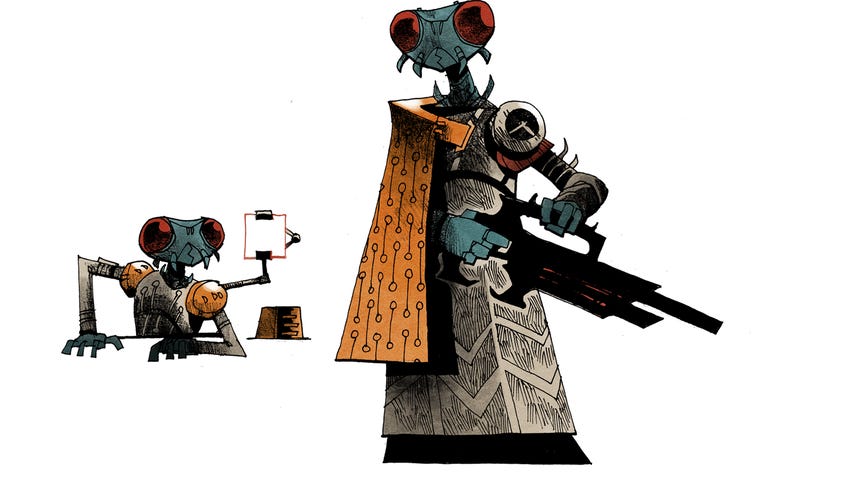
Arcs was always destined to be hugely ambitious and expandable, considering many of its ideas were built off the back of what Wehrle couldn’t fit into Oath. Wehrle makes board games that spill over into each other. They’re not just designed to be fun to play; they’re built to be dissected, unraveled and pondered over. It’s why they take so long to make.
“I always want to say that the most important thing isn't the players - it's the conversation,” says Wehrle. “It's not just about who's winning and who's losing, it's the conversation about experience. […] That discourse is so beautiful and powerful.”
From the sounds of it, Arcs is going to provide players with plenty to talk about.
